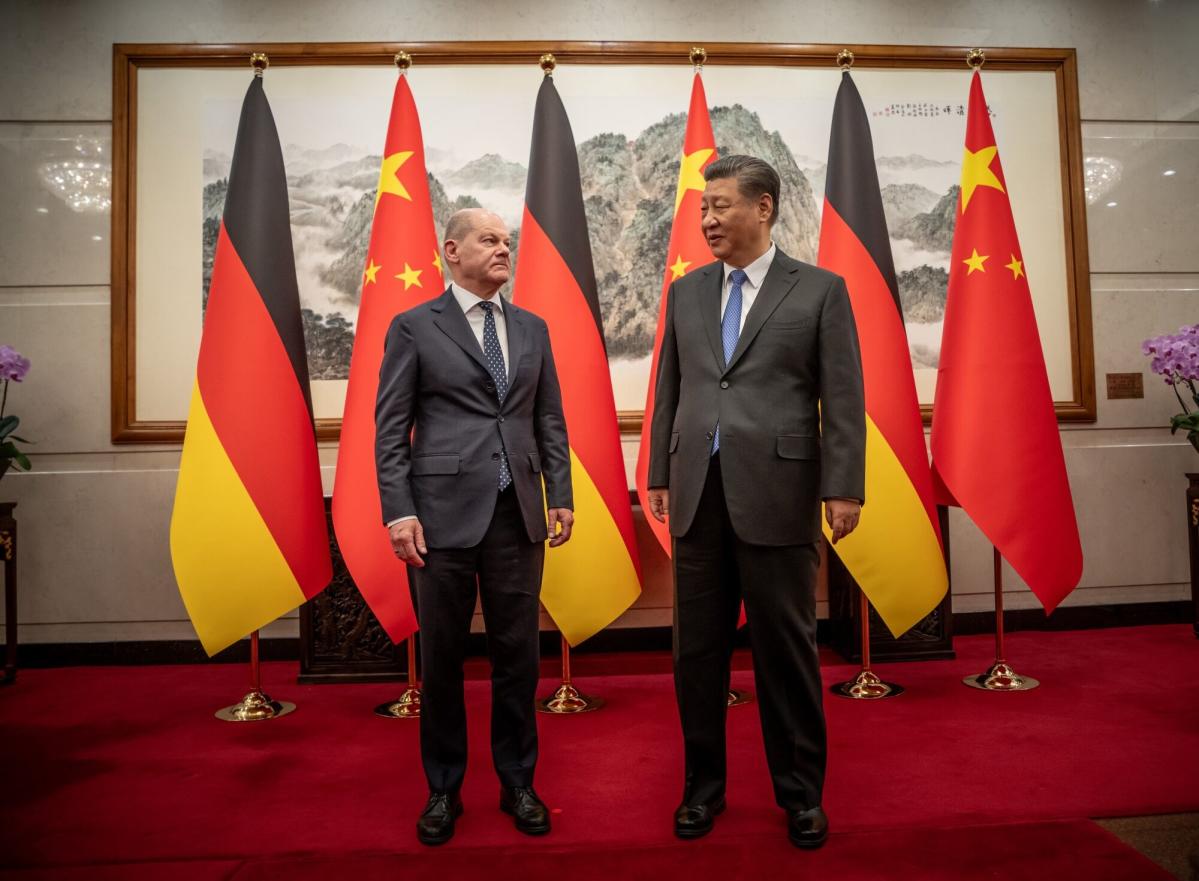(Bloomberg) — Chinese leader Xi Jinping told his German counterpart that a surge in Chinese clean-technology exports has helped the world tackle inflation, as he pushed back against European and US pressure to rein in the country’s powerhouse industries.
Most Read from Bloomberg
Xi’s comments to Chancellor Olaf Scholz during talks in Beijing suggest China may not be swayed in any meaningful way by the German leader’s push for a reduction in what Western officials see as excess manufacturing capacity in the Asian nation.
Tensions between China and the European Union and US are mounting over trade, leading to threats of new barriers to commerce. The EU has launched probes into Chinese subsidies for electric vehicles and support for windparks, and is poised to begin an inquiry into the procurement of medical devices.
Read More: EU Goes on China Trade Offensive After Getting ‘Played’
“China’s export of electric vehicles, lithium batteries and solar products have enriched supplies to the global market and eased inflationary pressure, as well as made a great contribution for global efforts to tackle climate change and green transition,” Xi told Scholz, according to Chinese state television.
He said China and Germany should look at the question “objectively” and address it from a market perspective. He also warned against protectionism.
Scholz is on the final leg of his four-day trip to his nation’s main trading partner, his second visit to China as chancellor. He earlier warned Chinese officials to address overcapacity and treat foreign firms better. He’s due to hold talks with Chinese Premier Li Qiang later on Tuesday.
“Both China and Germany are trading nations that benefit greatly” from membership in the World Trade Organization, Scholz told reporters during joint statements with Xi before their talks.
“We are committed to strengthening the rules for global trade and developing them further together with the other WTO members,” he added.
US Treasury Secretary Janet Yellen said on a visit to China this month that the vast output of China’s factories had become a global problem. The US won’t take “anything off the table,” including the possibility of additional tariffs, to stem the flood of Chinese goods, she told CNN over the weekend.
Beijing has dismissed charges that the rapid growth of its EV industry was due to government subsidies as “groundless,” instead pointing to its innovation prowess.
Read More: EU Set to Launch China Probe on Medical Device Procurement
While Scholz has been careful to stay on good terms with his hosts, he has been more assertive about his nation’s worries than his predecessor, Angela Merkel, who prioritized business interests.
Scholz told an audience of university students on Monday in Shanghai that “competition must be fair.” He added that he would like to see “no dumping” and “no overproduction,” and that copyrights should be respected.
The criticisms aimed at China come as Xi leans on his nation’s massive manufacturing industry to reinvigorate economic growth that has faced headwinds from an unfolding property crisis, deflationary pressures and lackluster consumer demand.
China reported data on Tuesday that showed economic growth beat expectations in the first quarter as the industrial sector powered forward, although a tail-off in March activity signaled more support may be needed to sustain that momentum.
Scholz also said he’d talk to Xi about “how we can contribute more to a just peace in Ukraine.” He added that Germany and China needed to work together to find solutions to halt climate change and master the green energy transition in a socially just way.
Xi touted the importance of China-Germany ties as the world faces “increasingly more challenges and risks.” He said the two nations should “join hands to inject more certainties” internationally.
Scholz’s trip also coincides with fears about a wider war in the Middle East, as top Israeli military officials reasserted that their country has no choice but to respond to Iran’s weekend drone and missile attack.
Europe has been unhappy with China since the start of the fighting in Ukraine in early 2022. Beijing has provided Moscow with diplomatic and political support, and trade between the nations hit a record $240 billion last year, cushioning the blow from Western economic sanctions.
On Monday, Scholz told reporters in Shanghai that he would urge China to stop supplying so-called “dual use” products to Russia that can be used for military and civilian purposes.
He called on all nations “not to circumvent the sanctions imposed by the international community,” and to refrain from providing the Kremlin with weapons, including dual-use goods. China has said it has not and will not seek to benefit from the war.
–With assistance from Ben Holland.
(Updates with additional Scholz quotes starting in seventh paragraph)
Most Read from Bloomberg Businessweek
©2024 Bloomberg L.P.


